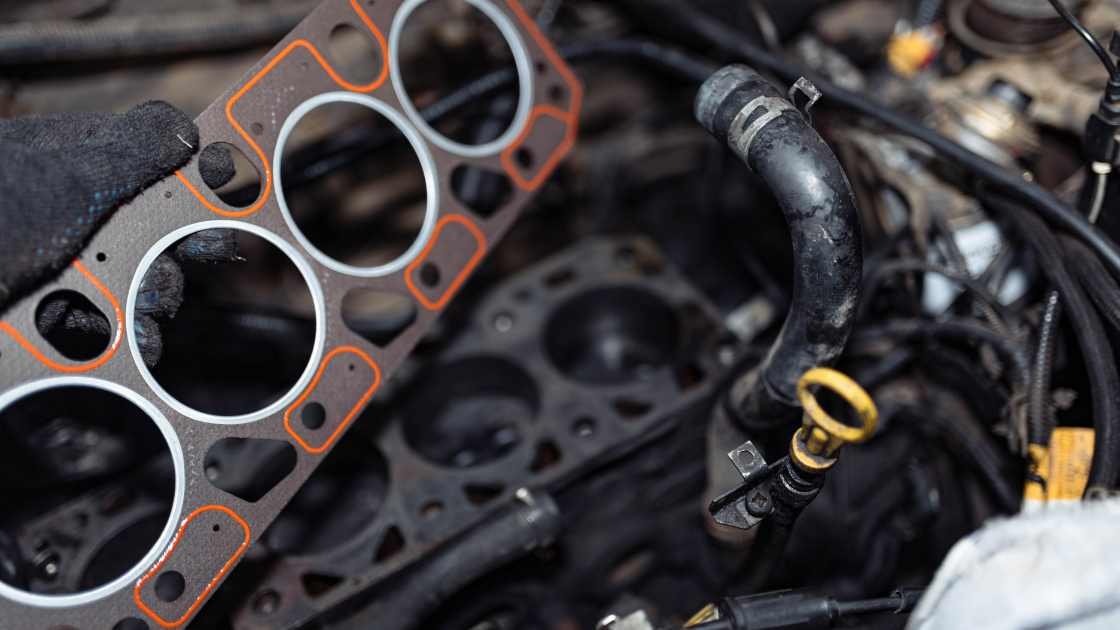The cost to fix an oil leak can range from $150 to $1200. The price varies based on the leak’s source and vehicle type.
Repairing an oil leak is crucial for maintaining your vehicle’s health and performance. Ignoring it can lead to more significant engine problems and reduced efficiency, potentially incurring higher costs down the line. The type of oil leak, whether it be from a faulty seal, gasket, or oil pan, can drastically affect the repair cost.
Addressing an oil leak in your vehicle is essential for both your wallet and the longevity of your car. How much does it cost to fix an oil leak? Well, that’s a question with a variable answer. To determine the exact expenses, mechanics typically need to conduct a thorough diagnosis of the issue.
Only after this inspection can they provide an accurate estimate. It’s essential to prioritize regular maintenance checks as they play a pivotal role in detecting oil leaks early on. By doing so, you not only minimize the potential damage to your vehicle’s engine and components but also potentially save on repair costs in the long run.

The Complexity Of Oil Leak Repairs
Fixing an oil leak in your car can be like solving a mystery. Each leak has a unique cause, requiring a detective’s eye. Diagnosing and repairing an oil leak is often not straightforward. This complexity can affect the cost significantly.
Factors Influencing Repair Costs
Several elements can change the price of fixing an oil leak. These include:
- The severity of the leak: A small drip costs less than a major breach.
- Location of the leak: Easy-to-reach spots tend to be cheaper to fix.
- Parts required: Some fixes need new parts which add to the total price.
- Labor: More hours worked equals a higher cost.
The Role Of Car Make And Model

Your car’s brand and design can play a big role in repair expenses. Luxury cars often have higher repair bills. Older models might need scarce parts, driving up the price. Below is a table showing sample cost differences.
| Car Make and Model | Estimated Repair Cost |
|---|---|
| Honda Accord | $150 – $250 |
| BMW 5 Series | $300 – $600 |
| Ford F-150 | $200 – $400 |
Remember, these are estimates and can vary. Check with a trusted mechanic for an accurate quote.
Identifying Oil Leaks

Imagine spotting a dark stain on your driveway where your car was parked. It could be an oil leak! These leaks are sneaky but familiar issues for vehicle owners. Identifying them early can save costly repairs. Here’s how to spot the tell-tale signs of an oil leak.
Common Symptoms Of Oil Leaks
Witnessing the signs of an oil leak is the first step to remedy the problem. Common symptoms include:
- Oil on the ground – This usually appears where you park your car.
- Engine smoke – Oil dripping onto hot parts may cause smoke.
- Low oil levels – Check the dipstick; low oil might indicate a leak.
- Unusual smells – A burning oil scent can point to a leak.
- Engine overheating – Oil leaks can lead to higher engine temperatures.
Diagnostic Approaches
Diagnosis involves a few steps to pinpoint the oil leak source. Use this organized approach:
- Visual inspection – Look for oil on the engine, undercarriage, or ground.
- Engine cleaning – Clean to see new leaks.
- Dye test – Add special dye to the oil that shows leaks under UV light.
- Pressure test – Apply pressure and check for leak sources.
- Professional mechanic – Consult for thorough diagnosis.
After identifying an oil leak, it’s essential to act fast to prevent further vehicle damage.
Average Cost For Common Oil Leak Repairs
Welcome to the essential guide on tackling the common issue of oil leaks in vehicles. Knowing the average costs for oil leak repairs is vital for car owners. It helps them prepare financially for the necessary fixes.
Costs vary depending on the type and extent of the repair. Below, is a dip into the average expenses associated with the most frequent oil leak issues.
Seal Replacements
Seal replacements are one of the simpler fixes for an oil leak. A leak from seals may occur due to wear over time.
- Camshaft seal: $150-$300
- Crankshaft seal: $150-$400
- Oil filter housing seal: $100-$200
Costs include parts and labor. Mechanics may suggest additional services during the replacement.
Gasket Replacements

Gaskets form tight seals between different components. A blown gasket is a common culprit for oil leaks.
| Gasket Type | Cost Range |
|---|---|
| Valve cover gasket | $80-$200 |
| Oil pan gasket | $100-$350 |
| Head gasket | $500-$1,500 |
The range can be wide as labor dominates the cost. Head gasket replacement is the most labor-intensive.
Oil Pan Repairs
The oil pan holds the oil when it is not circulating. Damage here can lead to serious leaks.
- Resealing: $100-$400
- Replacement: $300-$1,200
Pan damage often requires resealing or full replacement. The price hinges on accessibility and part costs.
The Impact Of Labor Costs
Understanding the impact of labor costs on fixing an oil leak is vital when budgeting for repairs. Labor can be a significant part of the total expense.
Dealership Vs. Independent Shop Rates
Choosing between a dealership and an independent shop affects labor costs greatly. Dealerships often feature factory-trained technicians. They have specialized knowledge of your vehicle’s brand.
Yet, this expertise comes at a premium. Independent shops offer more competitive rates. They are ideal for a cost-effective fix. Still, ensure the mechanics are experienced with your car model.
| Service Provider | Average Labor Cost |
|---|---|
| Dealership | Higher |
| Independent Shop | Lower |
Geographic Variation In Labor Costs
Labor costs for auto repairs are not uniform across the country. Urban centers with a higher cost of living often have higher labor charges. In contrast, smaller towns may offer more affordable rates. Researching local shops and comparing costs can lead to significant savings.
- Urban Areas: Typically higher labor costs.
- Rural Locations: Generally more budget-friendly.
Additional Expenses To Consider

When dealing with an oil leak in your vehicle, repair costs can stretch beyond the initial fix. It’s essential to consider every potential expense. These unexpected costs can impact your budget. Below are some additional expenses that you may encounter during the repair process.
Cost Of Replacement Oil
Oil is the lifeblood of your engine, and fixing a leak often means you’ll need to top it up. Depending on your vehicle’s model and the type of oil it requires, prices vary.
- Conventional oil: $20 – $30 for 5 quarts
- Synthetic blends: $30 – $45 for 5 quarts
- Full-synthetic oil: $45 – $70 for 5 quarts
Potential Engine Damage
An oil leak can lead to serious engine problems. Running an engine low on oil, even briefly, might cause damage. This can lead to costly repairs that far exceed the leak itself. Common issues include:
| Engine Part | Potential Repair Cost |
|---|---|
| Gaskets and seals | $150 – $1,000 |
| Bearings | $400 – $3,000 |
| Pistons | $500 – $4,500 |
Environmental Disposal Fees
Repair shops often charge a fee to dispose of old oil and car parts. These fees cover the cost of responsible disposal to protect the environment. Estimates for disposal fees are typically:
| Item | Disposal Fee |
|---|---|
| Oil | $2 – $5 per quart |
| Parts | $10 – $50 |
Prevention And Maintenance

Oil leaks in a vehicle can lead to severe damage and costly repairs. Proper prevention and maintenance are key to avoiding the high costs associated with fixing an oil leak. An effective maintenance strategy includes routine inspections and timely repairs to ensure long-term savings.
Routine Inspections
Regular checks can prevent serious issues. A simple way to make sure your car stays oil leak-free involves:
- Checking oil levels every month.
- Looking for dark spots or puddles under the car.
- Monitoring engine performance and mileage.
Scheduled servicing with a professional helps identify potential leaks early. Mechanics check for worn-out seals or damaged gaskets that might need attention.
Timely Repairs And Long-term Savings
Addressing oil leaks as soon as they appear can save money over time. Delaying repairs may lead to:
- Engine damage from low oil levels.
- Reduced vehicle efficiency and lifespan.
- Increased repair costs in the long run.
Proactive repairs can avoid extensive damage. Minor fixes are less expensive than major overhauls.
| Issue | Preventive Action | Cost if Ignored |
|---|---|---|
| Worn Seals | Replace during servicing | Higher |
| Damaged Gaskets | Inspect regularly | Higher |
| Oil Filter Issues | Change per schedule | Higher |
Frequently Asked Questions On How Much Does It Cost To Fix An Oil Leak
What’s The Average Cost For Oil Leak Repairs?
The average cost to fix an oil leak can range from $150 to $1200. These prices can vary widely depending on the leak’s cause and the vehicle’s make and model.
Can Oil Leaks Lead To Severe Engine Damage?
Yes, oil leaks can cause severe engine damage if left unaddressed. Loss of lubrication can lead to increased friction, overheating, and even engine failure.
Are Oil Leak Fixes Generally Quick?
Some oil leak fixes can be quick, like tightening loose bolts or replacing gaskets. Complex leaks may require extensive labor and part replacement.
Is It Possible To Do an Oil Leak Repair?
DIY oil leak repair is possible for minor leaks if you have the right tools and knowledge. Professional help is advised for major leaks.
Is it worth fixing an oil leak?
The decision to fix an oil leak depends on various factors, including the severity of the leak, the age and condition of the vehicle, and the cost of repairs. In many cases, addressing an oil leak is essential to prevent further damage to the engine and ensure the overall longevity and performance of the vehicle.
Can you still drive a car with an oil leak?
Driving a car with an oil leak is not recommended, as it can lead to severe engine damage and pose a safety risk. It is essential to address the leak promptly to ensure proper vehicle function and prevent long-term damage.
Conclusion
Repairing an oil leak can vary in cost due to several factors. From the severity of the leak to the make and model of your vehicle, expenses differ. It’s wise to address leaks promptly, avoiding further engine damage. Remember, early diagnosis and repair save money and extend your car’s lifespan.
Always consult a trusted mechanic for an accurate estimate.



2 thoughts on “How Much Does It Cost to Fix an Oil Leak?”
Pingback: How Much Does It Cost To Fix A Cracked Tooth?
Pingback: How Much Does An Exhaust Leak Repair Cost?